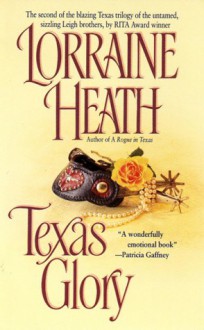Before I started reviewing the romance novels I read, I rarely thought about them for more than ten seconds after turning the last page, and often everything about the book would fly out of my head except for a vague positive or negative impression of the book, series, or author. So it is with Lorraine Heath: I've been reading her historical romance novels for years, with a generally favorable impression, but only the in the last few months have I noticed a pattern: a lot of her plots tread uncomfortably close to my personal squick threshold.
Now, no doubt everyone has their own personal point at which something becomes too icky for enjoyment, and also perhaps that point changes over time. For example, I know I'm a lot more sensitive to issues of nonconsent and violence now that I'm a domestic violence prosecutor than I was when I was prosecuting DUIs. I imagine someone who has been raped, or is close to someone who has, might be a lot less tolerant of old skool bodice rippers than she might have been prior to that experience. Likewise, someone whose lover is unfaithful might have even less patience than the average reader with infidelity tropes.
At any rate, I hadn't realized it until just now, but Lorraine Heath seems to have real talent for developing dramatic conflict that makes me very uncomfortable, but which usually does not cross the line where, for me, that discomfort reduces my enjoyment of a book. Some examples:
Lord of Wicked Intentions: The heroine's brother auctions off her virginity to settle his gambling debts. She thinks she's being introduced to potential husbands, and doesn't learn the truth until the winner, the hero, gets her home and tells her she's essentially a sex slave. Luckily, there's no forced seduction, and he undergoes a really emotionally satisfying redemptive character arc before the happy ever after, but there's no escaping the fact that the heroine doesn't have any real choice in becoming his lover.
In Bed with the Devil (Scoundrels of St. James, #1): The hero is in love with and hopes to marry someone else, but she, a commoner, is intimidated by his social standing (an Earl) and refuses his suit. In exchange for a helluva giant favor, the heroine agrees to give his would-be fiancee lessons in joining the aristocracy so that she will agree to marry the hero. Of course, the hero and heroine fall in love and start screwing around, and only the fact that the would-be fiancee knows she and the hero don't suit saves the hero's infidelity from seeming as reprehensible as, rationally, I know it is.
Between the Devil and Desire (Scoundrels of St. James, #2): The hero's mother sold him to a child molester when he was five. When he grows up, he unexpectedly is named the guardian to another five year old boy when the boy's father, a duke, passes away. Having had no real relationship with the duke, the hero believes for a time that the duke was the guy who diddled him, but it turns out the duke was actually his father. Of course, he learns this after he has married the duke's widow. That's right: he marries his stepmother and becomes stepfather to his own half-brother. Kind of gross, eh?
Texas Destiny (Texas #1): I really love this book. It makes you feel all the feelz, but the dramatic conflict, satisfying though it is, is pretty squicky. The heroine is a mail order bride who comes to Texas to marry the hero's brother. She and the hero fall in love on the long, treacherous trip from the train to the brother's very, very remote ranch, but the hero doesn't want to be the bastard who steals his brother's girl, so he lets her marry the brother anyway. -And they do marry, and it's totally worth reading the book to find out how they untangle that complication.
Texas Glory (Texas #2): Don't feel too badly for the brother whose wife got stolen; he's wealthy enough that in the next book, he just buys himself another. That's right: the hero buys his bride from his enemy in exchange for giving water and grazing rights to her family. At the time, he thinks she's been disfigured by Indians and doesn't have a nose -- but he doesn't care, as long as her ladybits work and she can give him an heir. Thankfully, he's not as evil as the creepers in the family that sold her, so marrying the hero is actually as significant improvement in her circumstances. Also, imagine how liberating it must be to have a husband willing to marry you even believing you're hideously disfigured. He married her thinking she was missing half her face (she wasn't), so what's he going to care if she packs on some extra pounds as the years go by?
I have about eight other books by Lorraine Heath on my kindle that I read a long while ago, and she's got others that I've never read, and now I'm fascinated to know if all of her books skirt so close to my squick threshold, and if any of them go over the line.

 Log in with Facebook
Log in with Facebook 












